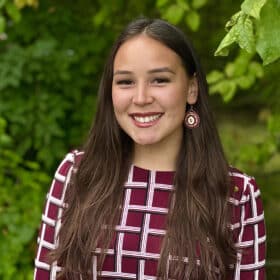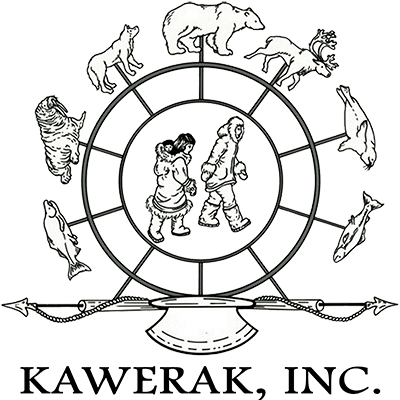What does Inuit-led environmental conservation mean to you?
To me, Inuit-led environmental conservation means advocating for our land and way of life through Indigenous knowledge and traditional practices. For countless generations, our people have not only survived but flourished within these lands. The land and ocean are our backyard – and our ancestors know the land and knowledge like no other. I honor the wisdom, resilience, and rich connection my Iñupiat ancestors have created with the ocean, land, and the diverse animals that inhabit our home.
Inuit-led environmental conservation is a critical force in addressing the complex challenges faced in the Arctic. It combines Indigenous knowledge and Western science (the Two-Eyed Seeing approach) to protect the well-being of the future generations to come. It means educating our youth and bringing awareness to the importance of Arctic conservation and the unique challenges faced by our Indigenous communities. This includes sharing stories, Indigenous knowledge, and the impacts of environmental changes.
What are your educational and career goals? How do your goals relate to environmental conservation?
Following the completion of the One Health Masters program at UAF, I intend to pursue a Ph.D. program encompassing One Health and Indigenous ways of knowing. I also have plans to pursue a Master of Business Administration. The Caleb Scholars Program is extremely important for allowing me the opportunity to not only further my education; but however, to promote the success of Indigenous peoples.
I am eager to advance my research focused on understanding the repercussions of climate change on human, animal, and environmental health within rural Alaskan communities. My primary objective is to explore strategies for mitigating the factors of climate change that contribute to coastal erosion, sea-ice thinning, permafrost thawing, and the detrimental impact of environmental changes both on local wildlife and the Inuit way of life.
I am passionate about conducting climate change research that focuses on the One Health approach in the Arctic. Additionally, I am dedicated to researching health disparities within Alaska Native communities. My goal is to actively engage in fellowships, collaborate with tribal leadership, and advocate for programs that promote the health and well-being of both animals and humans while protecting the environment.
Please share a reflection of when you have felt a connection to the ocean or the land.
Hearing this question brought back memories of a poem I wrote about home. Throughout my life, I have always felt the nunalu tagiuġlu (tundra and ocean) pulling me home. It’s when I find myself out on the nuna (tundra) picking aqpiit (cloudberries) under the midnight sun that I experience a deep sense of rootedness. The aroma of sargiġruak (stinkweed), the earthy fragrance of soil, and the sound of the ocean leaves my heart feeling content. There is no other feeling that can compare to being at home.
Coming from a subsistence whaling community, where my Aapa (grandpa) served as a whaling captain, my heart’s true compass guides me, always leading me back to the ocean – a source that enriches us both physically and spiritually. This connection to the land and the ocean, our Iñupiaq values and way of life is what drew me to the One Health Masters degree, a program that encompasses the health of humans, animals, and the environment as one.
Ulġuniq
I am from the sound of airplanes flying above
Where snowbirds chant their songs of love
A place you can hear the tiniest waves crashing
From anywhere in Wainwright
I am from the taste of sea salt when you’re driving along the ocean
A place you know all the dirt roads by heart
Even if you were blindfolded
I am from a place of community gatherings and Nalukataq whaling feasts
Where everything is passed along by the sound of familiar voices
A place where my Aaka’s tuttu soup hasn’t tasted any better
Where Eskimo donuts seem as if they are always cooking on the stove
I am from a place of pitch-black winters
Where the sound of the wind howls in the negative forty-degree weather
A place where the sun doesn’t ever set in the summer
Ulġuniq is my Home

